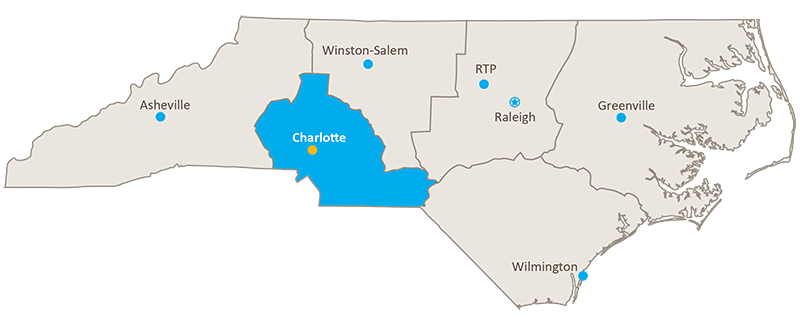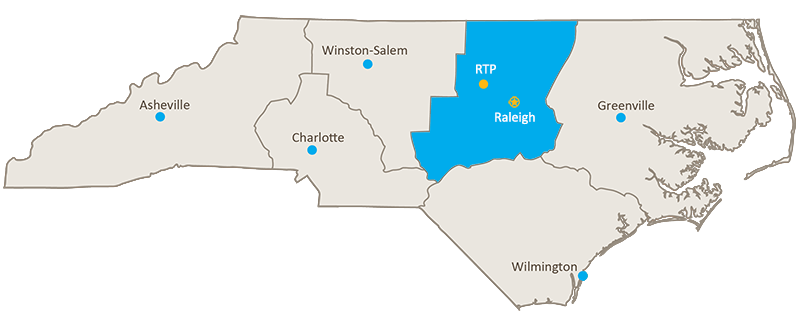
Shared Research Facilities and Equipment
Many facilities across North Carolina support life sciences research.
The listing covers core laboratory facilities at university and nonprofit research institutions that are open to researchers or collaborators outside of their home institutions.
Representatives of the core facilities listed below have voluntarily submitted their information. Not all institutions list available core lab facilities, but many are in the process of organizing and compiling these resources. As this information becomes available, we'll add those links.
NCBiotech has funded equipment in many core facilities in the state.
The Center's ongoing role is to provide this information portal. If you would like to submit a new listing or update an existing listing please fill this form.
Nutrigenomics, microbiome analysis, whole genome, exome, targeted gene sequencing, RNA-sequencing, microbiota characterization, DNA, RNA, bomb calorimetry, consulting
- Genetics & Genomics
- Human Performance, Nutrition, & Physiology
- Other -omics & Analytical
The Proteomics and Metabolomics Shared Resource provides broad mass spectrometry services to academic and industry investigators. The PMSR mission is to provide access to advanced mass spectrometry techniques for quantitation and identification of proteins, metabolites and other molecules of interest in biological and clinical samples. In addition to the fee-for-service, the Shared Resource offers options to accommodate various needs such as training and project-based collaborations. All services are scheduled and managed through iLab https://wfbmc.ilabsolutions.com/account/login).
proteomics (discovery and targeted analysis of proteins and posttranslational modifications including phosphorylation, acetylation, oxidation, etc)), metabolomics, lipidomics, pharmacokinetics
- Other -omics & Analytical
We provide consultations and collaborations on research studies requiring computational structural biology methods. The analyses available through the core (part of the UNC Center for Structural Biology) are not limited to the study of static structures, but also include molecular dynamics studies for analyzing the contribution of dynamic and collective motions to macromolecular functionality.
structure visualization, modeling and analysis, sequence analysis, Protein Data Bank (PDB) and Pymol Modeling
- Biostatistics, Bioinformatics, & HPC
- Crystallography, X-ray Diffraction, NMR, & EPR
- Pharmaceutical & Drug Discovery
We are a histology oriented core lab that has the ability to perform a range of histological services. Mallory Korman, HTL (ASCP) has recently joined the team as the supervisor and primary contact for scientific help. Prior to this position, Mallory had managed the Research Histology Core laboratory at Stony Brook Medical Center in New York for five years and had maintained excellent standards quality, effectiveness and efficiency. These standards are our top priority here at Carolinas HealthCare System and we will be more than happy to help you obtain your histological goals. We offer scientific help to help clients prepare for their study in order to yield the most optimal histological results. We work with a large range of species which also includes human sample studies. We feel it’s important to first help the client to understand the best possible ways to prepare their samples depending on what assays they would like to have completed. This helps to ensure that the obtained results are as optimal as possible.
histological processing, paraffin embedding, sectioning tissue via microtome as well as cryostat, H&E staining, immunohistochemistry, immunofluorescence, bone decalcification, tissue microarray construction
- Pathology/Histology
SMIF provides researchers with access to advanced imaging, characterization and clean room fabrication capabilities. SMIF is available to all Duke University researchers and to external users from other universities, government labs, and industry
Electron Microscope (SEM, TEM, Cryo-TEM)
Atomic Force Microscopy (AFM)
Optical Spectroscopy (Raman, UV-Vis, FTIR)
XPS and XRD
Microfluidic "Lab on a Chip" fabrication
- Crystallography, X-ray Diffraction, NMR, & EPR
- Imaging & Microdissection
- Nanotechnology
surface plasmon resonance (SPR), circular dichroism, analytical ultracentrifugation, bio-layer interferometry (BLI)
- Other -omics & Analytical
Bruker Avance II 700 MHz, Bruker Avance I 700 MHz with sample changer, Varian Inova 600 MHz
- Crystallography, X-ray Diffraction, NMR, & EPR
- Other -omics & Analytical
Thermo Orbitrap Elite, Waters Q-TOF Premier, Waters Xevo-TQ Triple Quadrupole, Sciex API-3000 Triple Quadrupole
- Other -omics & Analytical
consulting, sample preparation and crystalization, data collection, data analysis, SER-CAT collection
- Crystallography, X-ray Diffraction, NMR, & EPR
The TMS Laboratory provides mass spectrometry analysis and training to the UNC-Greensboro campus community and the surrounding Piedmont Triad. Our instrumentation can be tailored to small molecule, metabolomics, and/or protein/peptide analyses. Ionization Sources: ESI, APPI, APCI, MALDI, DESI Separation Instrumentation: Waters Aquity UPLC, Agilent 1100 HPLC Open to scientific researchers in the Piedmont Triad on a fee for service basis who are in need of mass spectrometry analysis. (Please see website http:triadmslab.uncg.edu)
MS instrumentation: Thermo Q Exactive Plus, Thermo LTQ Orbitrap XL, Thermo TSQ Quantum Access (triple quad), Waters Synapt G2 HDMS qTOF, Shimadzu GC-MS
- Other -omics & Analytical







